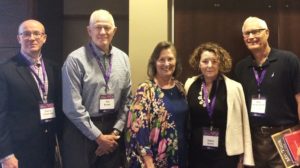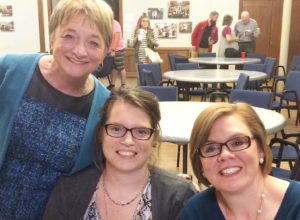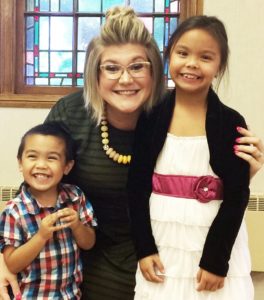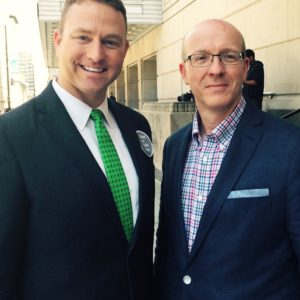By Blake Tommey

Missouri is a lush oasis for predatory loans, with more payday lenders there than Starbucks, McDonald’s and Walmart stores combined. In 2017, Missouri lenders issued more than 1.6 million payday loans—averaging about one in four residents—each carrying an average annual interest rate of 462 percent. Add tens of millions of dollars in fines, and you have an abuse of epidemic proportions.

Ministers and members from University Heights Baptist Church pause for a photo during the 2017 General Assembly in Atlanta, Ga.
In May 2018, the Missouri House Financial Institutions Committee passed a bill that claimed to curb predatory lending, but still allowed a 35-percent interest increase every two weeks. That translates to 910 APR—nearly twice the average interest rate on a payday advance!
One hundred and fifty miles south in Springfield, University Heights Baptist Church isn’t fooled, and isn’t waiting for an act of the state legislature or United States Congress to protect its vulnerable neighbors. They’re taking matters into their own hands with University Hope, a ministry that provides small rescue loans to individuals and families trapped in the predatory loan cycle. When a person is desperate to make ends meet, payday loans become an easy fix, UHBC pastor Danny Chisholm explained, until borrowers find themselves trapped under astronomically high interest rates, unable to ever repay the loan.

Then-CBF Executive Coordinator Suzii Paynter (left) attended Baptist Heritage Day at University Heights in November 2017.
“It’s a blight on our community,” Chisholm said. “Someone can receive a $500 payday loan and pay thousands and thousands of dollars in interest and fees without ever touching the principal amount. We found that to be simply immoral.”
University Hope begins its process as a family or individual trapped in a predatory loan of $1,000 or less contacts UHBC to inquire about a rescue loan. He or she then meets with a volunteer who reviews the loan, the candidate’s income sources and the cost to dismiss the loan altogether. If the candidate meets all requirements, the volunteer accompanies him or her across the street to the Educational Community Credit Union, which issues a line of credit, underwritten by UHBC, for the dismissal amount. With a 9.5 to 10 percent annual interest rate, the new rescue loan gives that person or family tremendous hope for finally escaping their debt.

Abby Hathcock, UHBC minister to children, poses with church members.
Since University Hope’s inception in 2016, more than 60 borrowers have received rescue loans and eight have already completed repayment, thanks to dramatically lower monthly rates. Ultimately, providing hope to debt-trapped neighbors isn’t just helpful, Chisholm emphasized, it’s the church’s calling from Jesus.
“When we started this conversation a few years ago, it was birthed out of a sermon from Luke 4, Jesus’ first sermon, when he says ‘the Spirit of the Lord is upon me to bring good news to the poor, to proclaim release to the captives and recovery of sight to the blind, to let the oppressed go free.’ We really latched onto that component and thought about one tangible way we could do that. That’s when we decided to confront the payday loan problem,” Chisholm said.
Those early conversations, inspired by partners Faith Voices of Southwest Missouri and the Council of Churches of the Ozarks, led UHBC to not only provide rescue loans, but to address the isolation and loss of dignity that surround payday lending, he said. Thus, UHBC pairs each borrower with a mentor who provides encouragement and accountability throughout the repayment process. Furthermore, when a candidate repays the rescue loan, he or she continues as a customer of the credit union and can access that line of credit in the future at the same affordable interest rate. The resulting rise in overall credit empowers the borrower to face future needs with greater financial security.

University Heights pastor Danny Chisholm (right) stands with CBF Associate Coordinator of Partnerships and Advocacy Stephen Reeves during an event to speak out against predatory lending practices.
In June 2017, UHBC expanded University Hope to offer affordable loans before local residents turn to expensive payday or title loans. In partnership with TelComm Credit Union, University Hope now provides low-interest loans ranging from $500 to $750 to help local individuals and families negotiate urgent income needs such as a medical bill or car repair. Whether before or after a payday loan, University Hope aspires most of all to reinstate the hope and self-respect that belong to every person, no matter what choices they’ve made.
“We want to help people regain a sense of hope,” Chisholm said. “For those who have fallen into a debt trap and gotten involved in predatory loans, there’s a lot of shame. You lose some of your dignity. We want to hear people’s stories and help them if we can. We want to restore a sense of hope for people and help them regain that dignity as they get a better handle on their finances and make progress toward becoming debt-free.”
This article appeared in the Spring 2019 issue of fellowship! magazine, the quarterly publication of the Cooperative Baptist Fellowship. Read online here and subscribe for free to fellowship! and CBF’s weekly e-newsletter fellowship! weekly at www.cbf.net/subscribe.
The Cooperative Baptist Fellowship is a Christian Network that helps people put their faith to practice through ministry efforts, global missions and a broad community of support. The Fellowship’s mission is to serve Christians and churches as they discover and fulfill their God-given mission. Learn more at www.cbf.net.
